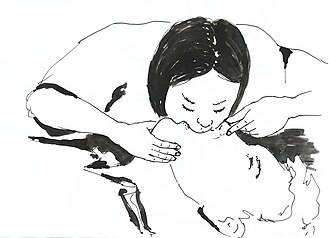The printable version is no longer supported and may have rendering errors. Please update your browser bookmarks and please use the default browser print function instead.
- If the patient is breathing, do not administer rescue breathing. Rescue breathing is an emergency treatment that may help the victim regain the ability to breathe on his own.
- Tilt the victim's head back, and lift their chin (head-tilt chin-lift). The head will not remain in this position by itself, you must maintain the head-tilt chin-lift throughout.
- In certain cases, you may not be able to give rescue breaths through the mouth - blow into the nose and seal the mouth instead.
- Pinch the victim's nose
- Put your mouth on the mouth of the victim, maintaining a good seal, and blow into the mouth. These breaths should be gentle and last no longer than 2 seconds to prevent air from entering the stomach.
When you have given two rescue breaths, begin chest compressions if you are trained to do so. Otherwise, continue with rescue breathing: 2 breaths every 5 seconds.
If the victim has recovered spontaneous respiration, put him in the recovery position, cover him, and monitor his breathing on a regular basis until an ambulance arrives.

